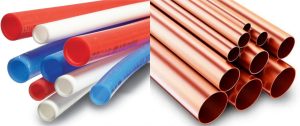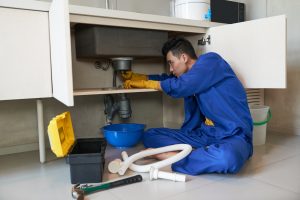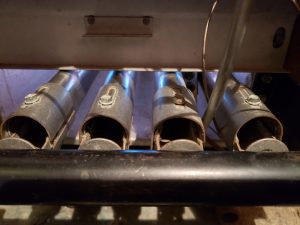Is it really true? Can we possibly be finished with winter? It’s certainly nice to see some warmer weather and the disappearing snow banks. Hopefully, you were able to survive the deep freeze this year without any major plumbing emergencies. It was one of the coldest winters that we’ve had in a long time. The number of frozen or burst water pipes was record-breaking this past February.
I think maybe we should spend a few minutes discussing sump pumps. This seems to be the next batch of plumbing emergencies to come after winter. Not every home has a sump pit and pump. It really depends on the age of your house and whether any renovations had to include one. I’d like to quickly explain its purpose, just for those of you who aren’t familiar with them.
Sump pump 101
The foundation of your house is several feet below ground. Around your foundation is a large 4″ pipe with small perforations in it laying in a gravel bed. This pipe (weeping tile) encircles your entire house at the base of the foundation. The purpose of this pipe is to carry away ground water from the foundation and keep it dry. Years ago this pipe would tie into the sewer system under your house and the groundwater would be taken away to the city’s water treatment plant. Now, however, due to the high cost of treating sewage and stormwater, many municipalities have decided to mandate the use of a pump to discharge this water back outside your house to spill harmlessly onto your lawn (in an ideal situation).
The pump itself is pretty basic, it has a float on a short cord, or a float attached to a vertical rod. When the water level rises in the pit, the float switch activates your pump which sucks out the water from the sump pit and discharges it outside.
Test your sump pump, and replace it!
So now that we know more than you ever wanted to know about sump pumps, what kind of maintenance do these require? First, be sure to ask your plumber to show you how to test it to make sure that it is operating properly. The pump should be monitored regularly and physically operated at least once at the beginning of the spring and going into fall. I recommend replacing the sump pump every 5 years. Most pumps will probably last longer, but switching out the pump before it dies will definitely be cheaper than paying the deductible on your home insurance after a flood. Speaking of which, make sure to check with your insurance provider to see if you are covered for water damage, and ask what kind of water damage is as well (some policies will only protect you from stormwater, but not sewage).
Have a Backup plan
There are a few additional things that you can do to limit the possibility of a sump pump emergency. Often, during a severe rain storm, there may be power outages due to any number of reasons. When this happens, unfortunately, your sump pump is about as useful as a brick. It won’t do a thing. For these rare occasions, it is a good idea to install a battery backup system that will continue to operate during a power failure. This backup system is a secondary pump, with a smaller horsepower rating, but is usually good enough to get you through any brief power failure. The added benefit is that it will also alert you if the primary pump fails for any other reason. As soon as the backup pump is triggered, a siren is sounded to alert you that something isn’t right. Another precaution I usually recommend is having your home monitoring company install a “high water alarm” and connect it to the house alarm system, this will alert them to any sign of trouble and they will contact you or your emergency contact in the event that you are away from home while this happens.
Be sure to check with your local municipality to see if there are any rebates available. In order to qualify for the rebates keep in mind that the work will have to be performed by a licensed plumber or another qualified contractor.
Emergencies happen, but hopefully, you’ll be able to severely reduce the chance of it happening to you. Please call us if you live in the Toronto or Mississauga area. We would be happy to discuss this further by phone or email, and we can recommend the best product or service to suit your family’s needs.






